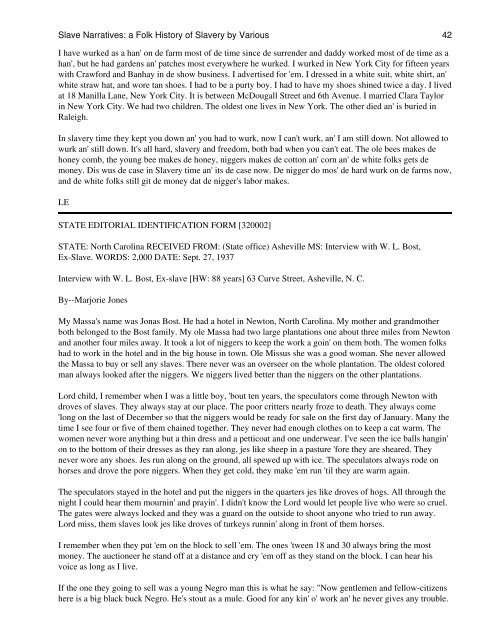Slave Narratives: a Folk History of Slavery in the United States
Slave Narratives: a Folk History of Slavery in the United States
Slave Narratives: a Folk History of Slavery in the United States
Create successful ePaper yourself
Turn your PDF publications into a flip-book with our unique Google optimized e-Paper software.
<strong>Slave</strong> <strong>Narratives</strong>: a <strong>Folk</strong> <strong>History</strong> <strong>of</strong> <strong>Slave</strong>ry by Various 42I have wurked as a han' on de farm most <strong>of</strong> de time s<strong>in</strong>ce de surrender and daddy worked most <strong>of</strong> de time as ahan', but he had gardens an' patches most everywhere he wurked. I wurked <strong>in</strong> New York City for fifteen yearswith Crawford and Banhay <strong>in</strong> de show bus<strong>in</strong>ess. I advertised for 'em. I dressed <strong>in</strong> a white suit, white shirt, an'white straw hat, and wore tan shoes. I had to be a purty boy. I had to have my shoes sh<strong>in</strong>ed twice a day. I livedat 18 Manilla Lane, New York City. It is between McDougall Street and 6th Avenue. I married Clara Taylor<strong>in</strong> New York City. We had two children. The oldest one lives <strong>in</strong> New York. The o<strong>the</strong>r died an' is buried <strong>in</strong>Raleigh.In slavery time <strong>the</strong>y kept you down an' you had to wurk, now I can't wurk, an' I am still down. Not allowed towurk an' still down. It's all hard, slavery and freedom, both bad when you can't eat. The ole bees makes dehoney comb, <strong>the</strong> young bee makes de honey, niggers makes de cotton an' corn an' de white folks gets demoney. Dis wus de case <strong>in</strong> <strong>Slave</strong>ry time an' its de case now. De nigger do mos' de hard wurk on de farms now,and de white folks still git de money dat de nigger's labor makes.LESTATE EDITORIAL IDENTIFICATION FORM [320002]STATE: North Carol<strong>in</strong>a RECEIVED FROM: (State <strong>of</strong>fice) Asheville MS: Interview with W. L. Bost,Ex-<strong>Slave</strong>. WORDS: 2,000 DATE: Sept. 27, 1937Interview with W. L. Bost, Ex-slave [HW: 88 years] 63 Curve Street, Asheville, N. C.By--Marjorie JonesMy Massa's name was Jonas Bost. He had a hotel <strong>in</strong> Newton, North Carol<strong>in</strong>a. My mo<strong>the</strong>r and grandmo<strong>the</strong>rboth belonged to <strong>the</strong> Bost family. My ole Massa had two large plantations one about three miles from Newtonand ano<strong>the</strong>r four miles away. It took a lot <strong>of</strong> niggers to keep <strong>the</strong> work a go<strong>in</strong>' on <strong>the</strong>m both. The women folkshad to work <strong>in</strong> <strong>the</strong> hotel and <strong>in</strong> <strong>the</strong> big house <strong>in</strong> town. Ole Missus she was a good woman. She never allowed<strong>the</strong> Massa to buy or sell any slaves. There never was an overseer on <strong>the</strong> whole plantation. The oldest coloredman always looked after <strong>the</strong> niggers. We niggers lived better than <strong>the</strong> niggers on <strong>the</strong> o<strong>the</strong>r plantations.Lord child, I remember when I was a little boy, 'bout ten years, <strong>the</strong> speculators come through Newton withdroves <strong>of</strong> slaves. They always stay at our place. The poor critters nearly froze to death. They always come'long on <strong>the</strong> last <strong>of</strong> December so that <strong>the</strong> niggers would be ready for sale on <strong>the</strong> first day <strong>of</strong> January. Many <strong>the</strong>time I see four or five <strong>of</strong> <strong>the</strong>m cha<strong>in</strong>ed toge<strong>the</strong>r. They never had enough clo<strong>the</strong>s on to keep a cat warm. Thewomen never wore anyth<strong>in</strong>g but a th<strong>in</strong> dress and a petticoat and one underwear. I've seen <strong>the</strong> ice balls hang<strong>in</strong>'on to <strong>the</strong> bottom <strong>of</strong> <strong>the</strong>ir dresses as <strong>the</strong>y ran along, jes like sheep <strong>in</strong> a pasture 'fore <strong>the</strong>y are sheared. Theynever wore any shoes. Jes run along on <strong>the</strong> ground, all spewed up with ice. The speculators always rode onhorses and drove <strong>the</strong> pore niggers. When <strong>the</strong>y get cold, <strong>the</strong>y make 'em run 'til <strong>the</strong>y are warm aga<strong>in</strong>.The speculators stayed <strong>in</strong> <strong>the</strong> hotel and put <strong>the</strong> niggers <strong>in</strong> <strong>the</strong> quarters jes like droves <strong>of</strong> hogs. All through <strong>the</strong>night I could hear <strong>the</strong>m mourn<strong>in</strong>' and pray<strong>in</strong>'. I didn't know <strong>the</strong> Lord would let people live who were so cruel.The gates were always locked and <strong>the</strong>y was a guard on <strong>the</strong> outside to shoot anyone who tried to run away.Lord miss, <strong>the</strong>m slaves look jes like droves <strong>of</strong> turkeys runn<strong>in</strong>' along <strong>in</strong> front <strong>of</strong> <strong>the</strong>m horses.I remember when <strong>the</strong>y put 'em on <strong>the</strong> block to sell 'em. The ones 'tween 18 and 30 always br<strong>in</strong>g <strong>the</strong> mostmoney. The auctioneer he stand <strong>of</strong>f at a distance and cry 'em <strong>of</strong>f as <strong>the</strong>y stand on <strong>the</strong> block. I can hear hisvoice as long as I live.If <strong>the</strong> one <strong>the</strong>y go<strong>in</strong>g to sell was a young Negro man this is what he say: "Now gentlemen and fellow-citizenshere is a big black buck Negro. He's stout as a mule. Good for any k<strong>in</strong>' o' work an' he never gives any trouble.
















